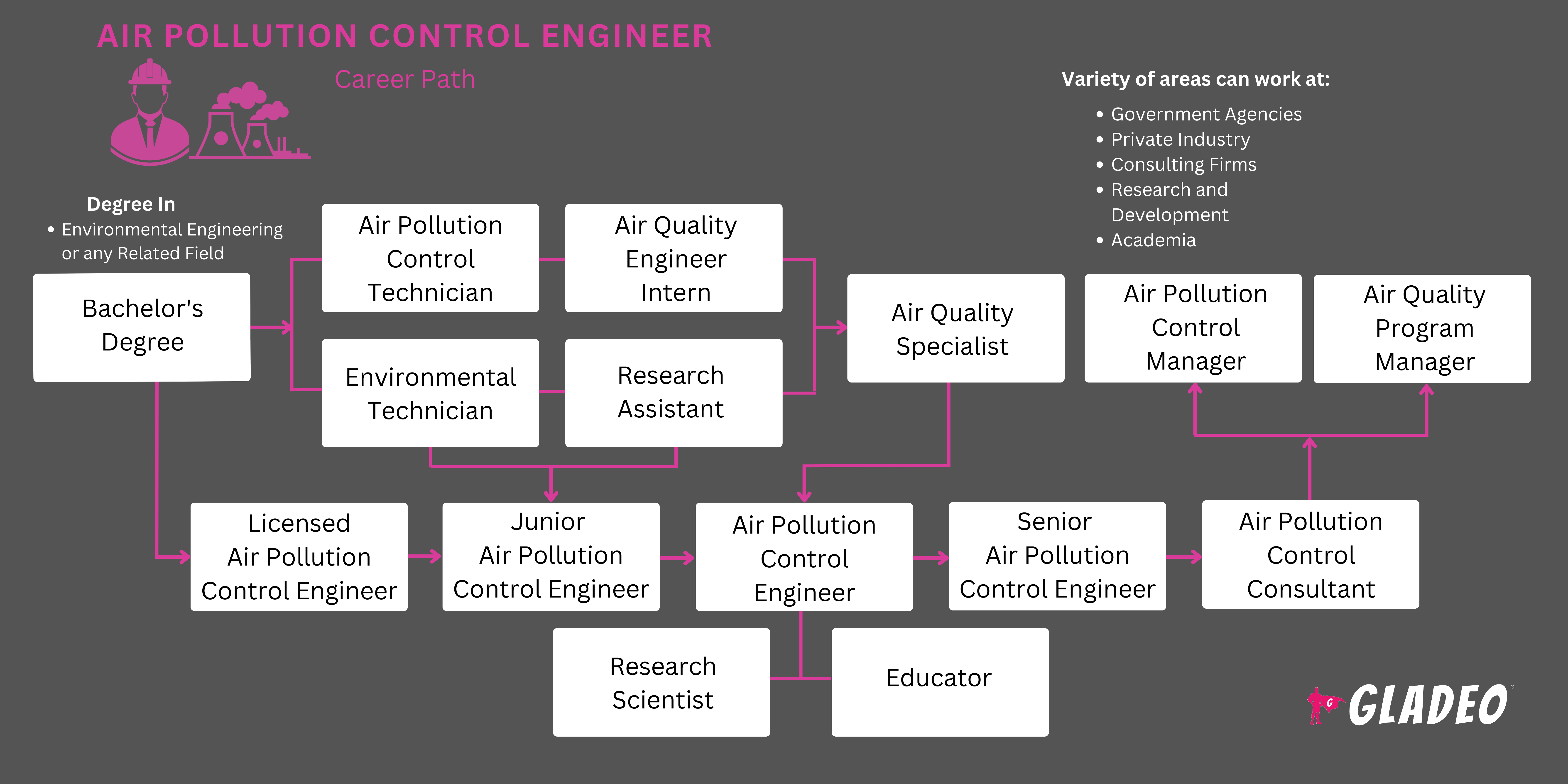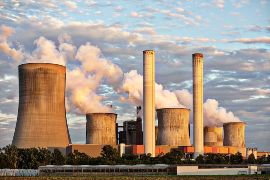Mga spotlight
Environmental Engineer, Air Quality Engineer, Air Quality Specialist, Environmental Compliance Engineer, Emissions Control Engineer, Environmental Health and Safety Engineer, Clean Air Specialist, Air Quality Analyst, Environmental Consultant (with a focus on air quality), Air Pollution Control Specialist
Air pollution is not only a huge and expensive problem, but it’s also everyone’s problem. Over 1/3rd of Americans “live in places with unhealthy levels of air pollution,” according to the American Lung Association. And if we don’t address it, that’ll extend to the rest of us eventually.
Poor air quality can lead to or contribute to a range of medical conditions like asthma, cardiovascular disease, metabolic problems, and issues with our nervous and reproductive systems.
Industries known for impacting air quality include energy production, transportation, manufacturing, agriculture, and more. Organizations in such industries use Air Pollution Control Engineers to design and implement systems that reduce harmful emissions, helping to ensure that industries can comply with air quality standards.
As a specialized type of environmental engineer, Air Pollution Control Engineers also identify sources of pollution, optimize control systems, and check that emissions aren’t exceeding legal limits. Their work safeguards public health and the environment while enabling industries to continue operations in a safer, more eco-friendly manner!
- Play a vital role in protecting public health and the environment
- Ensure adherence to air quality regulations and standards
- Contribute to sustainable industrial practices and environmental conservation
Oras ng trabaho
Air Pollution Control Engineers work full-time with overtime required for urgent projects or compliance deadlines. Travel may be necessary for onsite evaluations and system implementations.
Mga Karaniwang Tungkulin
- Conduct site inspections and audits; check emission sources and control systems
- Collect samples of soil, water, and gas, following Environmental Protection Agency guidelines
- Analyze and interpret environmental data using modeling, simulation tools, and Geographic Information Systems. Look for contaminants and pollutants
- Identify potential safety hazards and environmental risks. Ensure safe levels of air quality
- Collaborate with other engineers, scientists, and regulatory bodies
- Design and oversee the installation of air pollution control systems
- Develop strategies for reducing air pollutants such as greenhouse gases
- Ensure compliance with local, state, and federal air quality regulations
- Prepare documentation and reports for regulatory compliance
- Develop training programs on air quality management and pollution control
- Train and supervise newer technicians
Karagdagang Pananagutan
- Provide technical expertise on air quality impact assessments
- Calibrate test instrument
- Support investigations of incidents and accidents; determine root causes and recommend preventive measures
- Research trends, best practices, regulatory changes, and new technologies
Soft Skills
- Analitikal
- Pansin sa detalye
- Kritikal na pag-iisip
- Deduktibo at pasaklaw na pangangatwiran
- Mabusisi pagdating sa detalye
- Independent
- Integridad
- Pagsubaybay
- Objectivity
- Organisasyon
- Perceptive
- Pagtugon sa suliranin
- Pag-unawa sa pagbasa
- Nakatuon sa kaligtasan
- Malakas na kasanayan sa komunikasyon
Teknikal na kasanayan
- Air quality management and pollution control technologies
- Tugon sa emergency
- Engineering principles and practices
- Environmental monitoring, sampling, data collection, and analysis tools and techniques
- Mga regulasyon sa kapaligiran at mga hakbang sa pagsunod
- Environmental reporting tools
- Geographic Information Systems (GIS)
- Mobile and stationary sensors
- Pamamahala ng proyekto
- Pagsusulat ng ulat at presentasyon
- Safety and health assessment techniques
- Tools for data analysis, statistical modeling, and environmental modeling
- Agricultural organizations
- Mga kumpanya ng enerhiya
- Mga kumpanya sa pagkonsulta sa kapaligiran
- Government regulatory agencies (federal, state, and local)
- Manufacturing plants
- Public Utilities
- Mga institusyon ng pananaliksik
- Transportation authorities
Air Pollution Control Engineers may work in industrial settings, exposed to pollutants and hazardous conditions. They must closely follow protocols to avoid mishaps and ensure their health and safety.
Persistence, patience, and strong communication skills are needed to tackle industry challenges related to air quality issues. The health and welfare of workers, communities, and the environment are at stake, so they have to be diligent and effective to make a real impact.
Because technology and policies continue to evolve, they must strive to keep up with the changes through continuous learning.
In recent years, there’s been a lot of public and governmental pressure to protect the environment more—including our air quality! One initiative is the creation of the Environmental Protection Agency’s National Air Toxic Trends Sites network to assess trends and emission reduction program effectiveness.
A major goal is reducing criteria pollutants (carbon monoxide, lead, nitrogen dioxide, ozone, particulate matter, and sulfur dioxide) that pose serious health and environmental risks. Air Pollution Control Engineers are at the forefront of that push to reduce these harmful elements from our air by implementing regulations and using advanced tools like remote sensing for more precise monitoring.
AI has also been incorporated into the field, requiring engineers to update their tech skills so they can maximize the power of these new tools!
Anong mga uri ng mga bagay ang kinagigiliwang gawin ng mga tao sa karerang ito noong bata pa sila...
Students who become Air Pollution Control Engineers often have an interest in the natural world and environmental conservation. They might have loved science clubs, running around outdoors, and being involved with community-based sustainability projects. Many were interested in biology, chemistry, and environmental studies from an early age.
Students who become Air Pollution Control Engineers often have an interest in the natural world and environmental conservation. They might have loved science clubs, running around outdoors, and being involved with community-based sustainability projects. Many were interested in biology, chemistry, and environmental studies from an early age.
- Air Pollution Control Engineers usually need a bachelor’s degree in environmental or chemical engineering. Some positions require a master’s degree
- Relevant coursework may include:
- Air Pollution Control
- Air Quality Management
- Climate Change and Adaptation Measures
- Ecological Engineering
- Emission Control Technologies
- Environmental Chemistry
- Environmental Impact Assessment
- Environmental Microbiology
- Hazardous Waste Management
- Thermodynamics
- Water and Wastewater Treatment
- Hands-on experience through internships or cooperative engineering programs is highly beneficial
- Engineers may go on to take the Fundamentals of Engineering exam, earn a National Council of Examiners for Engineering and Surveying’s Engineer In Training certification, and pursue a National Society of Professional Engineers’ Professional Engineer license
- Workers may need a valid driver’s license to travel to job sites
- Look for ABET-accredited schools offering programs in environmental or chemical engineering
- Isipin ang iyong iskedyul at flexibility kapag nagpapasya kung mag-e-enroll sa isang on-campus, online, o hybrid na programa
- Seek programs with internship or cooperative education opportunities
- Isaalang-alang ang halaga ng matrikula, mga diskwento, at mga pagkakataon sa lokal na iskolarship (bilang karagdagan sa tulong na pederal)
- Look for programs that collaborate with external partners, which can augment your learning experience
- Suriin ang mga rate ng graduation at post-graduate na mga istatistika ng placement ng trabaho
- Participate in science and engineering clubs to gain practical skills
- Look for environmental projects to learn about air quality issues
- Focus on courses in mathematics, chemistry, physics, and environmental science
- Considering doing a pre-apprenticeship program in high school to gain practical hands-on experience where you can apply principles in the real world
- Seek mentorship or shadowing opportunities with air pollution professionals
- Ask a seasoned Air Pollution Control Engineer to do an informational interview with you, or see if you can shadow them at work for a day
- Get a part-time job related to air quality (such as an Air Quality Technician)
- Watch videos and read blogs like Airly and AirNow to stay informed about industry trends. Additional blogs include:
- Check out job descriptions posted on employment portals to determine the most current job qualifications and areas of specialization that might interest you
- Engage in air quality-related discussion groups like r/AirQuality on Reddit or other forums
- Join professional organizations like the National Association of Clean Air Agencies
- Apply for engineering scholarships or apprenticeships
- Keep track of work and academic accomplishments for your resume and college applications

- Upload your resume on job portals like Indeed, SimplyHired, Monster, USAJobs, ZipRecruiter, and Glassdoor
- Sign up for alerts so you won’t miss it when a new job is posted
- Suriin ang mga ad ng trabaho at maghanap ng mga keyword na ilista sa iyong resume, gaya ng:
- Air Pollution Control Engineering
- Air Quality Analysis
- Air Sampling Techniques
- Atmospheric Science
- Carbon Footprint Analysis
- Emission Control Technologies
- Emission Inventory
- Environmental Auditing
- Environmental Impact Assessment
- Environmental Risk Assessment
- Greenhouse Gas Emissions
- Hazardous Waste Management
- Industrial Hygiene
- Pollution Monitoring
- Review Air Pollution Control Engineer resume templates and sample interview questions
- Ask your school to connect you with recruiters. Take advantage of chances to intern with environmental safety-related organizations
- Reach out to your school’s career center to get resume help, do mock interviews, and learn about upcoming job fairs
- Do your research on potential large employers, such as:
- Sa panahon ng mga panayam, ipakita ang isang matalas na kamalayan sa mga uso sa industriya
- Magsuot ng propesyonal para sa mga panayam sa trabaho
- Ask previous professors and supervisors to write a recommendation
letters or request their consent (in advance) to list them as references
Mga website
- Accreditation Board para sa Engineering at Teknolohiya
- Air & Waste Management Association
- Air Knowledge
- Airly
- AirNow
- Air Pollution News
- Air Quality News
- AirQualityNews.com
- American Academy of Environmental Engineers and Scientists
- American Society for Engineering Education
- Association of Air Pollution Control Agencies
- Mga Sentro para sa Pagkontrol at Pag-iwas sa Sakit
- Coordinating Council sa Clinical Laboratory Workforce
- Konseho ng Industrial Engineering
- Daily Dose Of Air Pollution
- Kagawaran ng Enerhiya
- Ahensya sa Pangangalaga sa Kapaligiran
- Environmental Science.org
- Hazardous Waste Operations and Emergency Response Standard
- Indoor Air Quality
- Institution of Engineering and Technology
- International Society of Exposure Science
- National Association for Environmental Management
- National Association of Clean Air Agencies
- National Association of Environmental Professionals
- National Board of Public Health Examiners
- National Council of Examiners for Engineering and Surveying
- National Environmental Health Association
- National Environmental Health Science and Protection Accreditation Council
- National Institute for Certification in Engineering Technologies
- National Institute for Occupational Safety and Health
- National Institutes of Health
- National Radon Safety Board
- National Registry of Environmental Professionals
- National Safety Council
- Pambansang Lipunan ng mga Propesyonal na Inhinyero
- Pangangasiwa sa Kaligtasan at Kalusugan sa Trabaho
- Lipunan ng Environmental Toxicology at Chemistry
- United States Department of Agriculture
Mga libro
- Air Quality, by Wayne T. Davis, et al.
- Choked: Life and Breath in the Age of Air Pollution, by Beth Gardiner
- Climate Restoration: The Only Future That Will Sustain the Human Race, by Peter Fiekowsky and Carole Douglis
Air Pollution Control Engineers play a crucial role in guiding sustainable practices and policies to protect our natural world for future generations. But if this career field isn’t grabbing your interest, consider a few related fields that may also aid the environment, such as:
- Brownfield Redevelopment Specialist
- Inhinyero ng Kemikal
- Inhinyerong sibil
- Climate Change Analyst
- Conservation Scientist
- Emission Trading Specialist
- Environmental Compliance Inspector
- Environmental Consultant
- Environmental Engineering Technologist
- Environmental Policy Advisor
- Siyentipiko sa Kapaligiran
- Hydrologist
- Industrial Ecologo
- Industrial Hygienist
- Mechanical Engineer
- Natural Sciences Manager
- Espesyalista sa Pamamahala ng Proyekto
- Water/Wastewater Engineer
- Espesyalista sa Yamang Tubig
Newsfeed

Mga Tampok na Trabaho

Mga Online na Kurso at Tool








